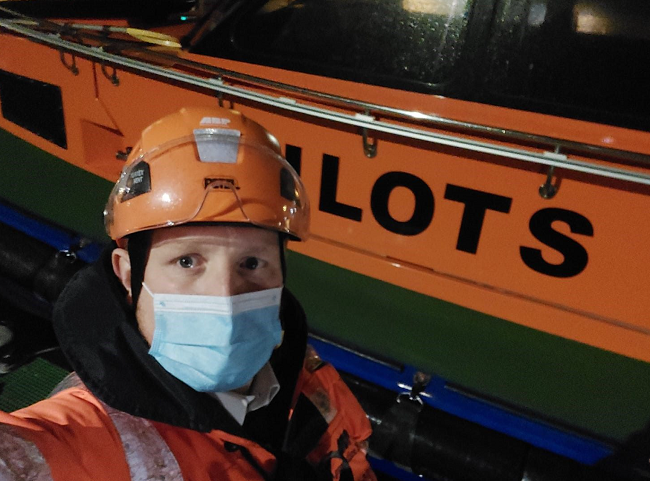Can you tell us more about what you did before you joined ABP?
I joined ABP in 2017 as a Pilot Boat Coxswain in Lowestoft Port. Before that I had been working at sea for around 13 years. I worked as Master doing towage and marine construction, all over the world. I gained valuable experience of ship handling during this time which I now put to use every day.
What did you find most appealing about an Apprenticeship at ABP?
I returned from sea in 2016 so I could work closer to home. I had been working for ABP as a relief pilot for a while and had heard about the apprenticeship programme from the Lowestoft Pilots. The Pilot apprenticeship was a new course at the time and I was keen to apply for it. Being a Pilot suited the boat handling experience I had gained at sea. I wanted to push myself and achieve more and this was a great opportunity to progress.
What does a typical day at work look like for you?
Each day is different. We have many different vessel types in Lowestoft, with different propulsion types and handling characteristics. The port is busy and I can often do up to 5 or 6 jobs in a day.
On a typical day I might get a call from Port Control at 0430 to muster at the office for 0530. We always do a safety brief before work to ensure everyone is aware of any safety issues and to discuss how the day’s jobs will be conducted. We board the ship from our Pilot launch and it’s the launch Coxswain’s job to ensure the transfer can be done safely. We either climb a ladder or step over to the ship, depending on how high the freeboard is. We do the MPX or Master/Pilot Exchange. This is an important part of the job where everything from defects to handling characteristics and the passage plan are discussed. From there we take the controls and drive the ship into the port and to her berth. Many of the vessels in Lowestoft will arrive and depart on the same day and some just come in for fuel and depart as soon as they complete bunkering.
Covid-19 has impacted everyone in some way. My training had to stop in 2020 and I supported the port in other ways by covering shifts in Port Control and as launch Coxswain. Now my training is full time again we take every precaution to stay safe. We wear gloves and a mask when on board the launch and for the duration of the pilotage. We follow social distancing guidelines and stick to rigorous hand washing and hygiene practises. With such a small team we feel it is even more important to stay safe.
What’s the most exciting project you are currently working on?
My training on ships is always exciting. We go out on demand, day or night for any vessel that requests a Pilot. The ship handling is challenging with tight turns, narrow gaps and the elements to contend with. We get a variety of vessels which all need to be handled differently. Each type of vessel requires a different skill set and this is learned through the experience of the training Pilots. It gives great variety to the job and never a dull moment.
If you could give some advice to young people who would like to follow in your footsteps, what would it be?
An apprenticeship is a fantastic way to start or boost a career. Alongside the formal qualification, the “on the job” element is the best way to learn. You observe and then do the job under the guidance of people with years of experience. There is no better way to learn. If you are willing to work hard and take on board the advice and guidance of those teaching you, an apprenticeship is definitely a great option.
The Pilot Apprenticeship scheme is perhaps the only route for someone with less experience or a smaller ticket, to become a Marine Pilot. ABP are trailblazing this programme and are proving that with the right training and guidance, those who wouldn’t be considered as a trainee Pilot can thrive. It requires time and commitment but in the end it is absolutely worth it. It’s also a highly enjoyable experience along the way.
Applications for ABP’s Apprenticeship Programme are open until Sunday 21st February. Find out more and apply here.


